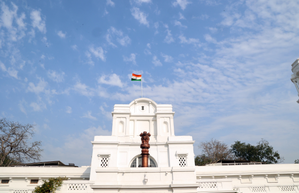

New Delhi, Aug 4 (IANS) A total of 103 Indian cities, as part of the National Clean Air Programme (NCAP), have shown a reduction in particulate matter PM10 concentration in 2024-25, the government informed the Parliament on Monday.
Launched in 2019 to tackle air pollution across India, NCAP focusses on 131 “non-attainment” cities and Million Plus Cities in 24 states. The programme aimed to reduce PM10 concentrations by 20-30 per cent by 2024.
Of the 103, “64 cities showed reduction in PM10 levels by more than 20 per cent and 25 of these cities have achieved a reduction of more than 40 per cent,” said Kirti Vardhan Singh, Union Minister of State in the Ministry of Environment, Forest and Climate Change, in a written reply in the Lok Sabha.
“A total of 22 Cities also met the National Ambient Air Quality Standards (NAAQS) and have PM10 concentrations less than 60 micrograms per cubic metre of air,” he added.
To address air pollution in urban areas, Singh stated that a “performance-linked grant of Rs 13,036.52 crore has been provided to 130 cities during 2019-20 till date, as a critical gap funding to implement air quality improvement measures”.
Further, the programme leverages the mobilisation of resources through the convergence of various schemes of the central government such as Swachh Bharat Mission (Urban), AMRUT, Smart City Mission, PM e-Bus Sewa, Sustainable Alternative Towards Affordable Transportation (SATAT), and Nagar Van Yojana, as well as the resources of state governments.
“Under NCAP, an amount of Rs. 5,318 crore has been provided to eight States/UTs that are part of the Indo-Gangetic plain to implement the city action plan of 41 targeted cities,” Singh said.
City-specific clean air action plans are prepared by all cities to implement air quality improvement measures in their respective cities. These plans target air pollution sources such as soil and road dust, vehicular emissions, waste burning, construction and demolition activities, and industrial pollution.
Notably, ambient air quality monitoring is carried out by the Central Pollution Control Board (CPCB) and State Pollution Control Boards (SPCB).
For this, “1,612 monitoring stations have been set up in 572 cities and four rural areas across the country,” the MoS said.
–IANS
rvt/
